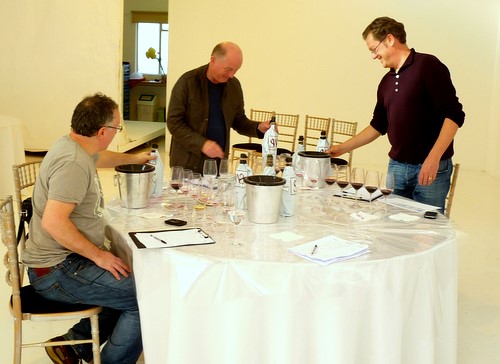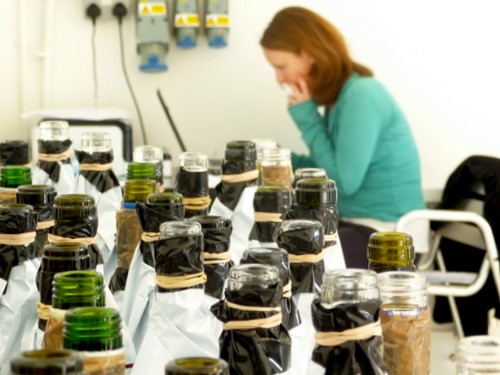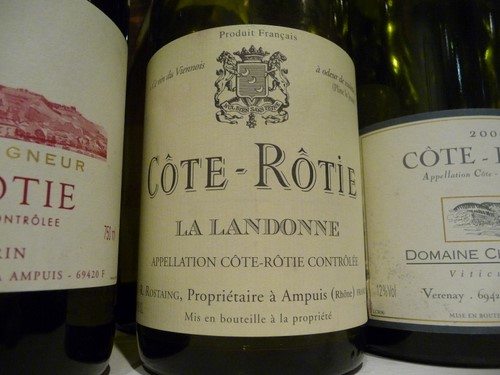So, today has been a busy day of tasting. It began with the IGP Top 100 tasting in Parson’s Green. Now IGP is what used to be Vin de Pays, and the goal of this tasting is to sift through 700 IGP wines and come up with a list of the 100 best.
 Doug Wregg, Oz Clarke and Peter McCombie: a tough table!
Doug Wregg, Oz Clarke and Peter McCombie: a tough table!
Then, after we’ve done this, we award trophies in a number of categories to the star wines. This is a useful exercise, because it helps consumers make reliable choices. The tasters are all very good, and the competition is impeccably chaired by Tim Atkin, who is very good at this sort of thing.
 Joe Wadsack tasting: one of the wine trade’s most engaging people, and wearing a tie!
Joe Wadsack tasting: one of the wine trade’s most engaging people, and wearing a tie!
Then, in the evening, after a chance to rest my palate, I was off to Roberson – one of London’s best merchants – for a tasting of Cote Rotie.
I love Cote Rotie, and we had a really interesting selection – the youngest wines were 10 years’ old. My two favourites were the 2001 La Landonne from Rene Rostaing, which was superbly elegant. Almost Burgundian. And the 1998 La Mouline from Guigal: we tried the three ‘La Las’ from 1998, and this was the most elegant and fresh.


A week or so ago tasting panels “sucked” because you didn’t agree with the results.
Now it looks like they are a “useful exercise” and they “help consumers make reliable choices.”
Which one is it Jamie?
Hi Chris
What I meant to emphasize is the panel tastings that don’t work are those where scores are averaged. In this approach (which is the same as the IWC), each wine is discussed and a score is reached that is not often the average score. For example, if two people are in strong favour and one disagrees, often we’ll exclude the dissenting voice. With wine, you often don’t reach a consensus. This is an important difference. Ultimately, any panel has to be judged by its results, though.
IMHO most of these large tastings suck—-or at least offer no real help to consumers.
I take notice of people such as yourself,who drink a wine with food,and not hundreds of wines in one afternoon.
Also important for consumers to know what wines were tasted,and why many wineries did not bother entering
Furthermore,what is the cost to wineries of entering these tastings.
One of the problems of competitions with these formats is, as touched on by Keith, that consumers actually believe the results. They believe that these really are THE best 100 wines. Not that the selected wines represent the 100 least disliked wines of a panel tasting a tiny fraction of the eligible wines.
The only small merit I see in these is that it might offer a small producer the opportunity to get their wine in front of the great and the good, as to few opportunities exist to do that. Providing of course they can be bothered to enter as it isnt cheap and theres no guarantee their wine will be looked after and cared for prior to the tasting
It is often the one descenting voice which I am most interested in hearing from. Consensus sucks.
*ATTENTION, THIS JAMIE IS REVERSING!*
This seems to be a hot issue right now. I think there should be a Top 100 Top 100 just to see which really is the top.
At the end of the day, most consumers just buy what’s on offer.
So called “John Smith” why is it that EVERY SINGLE comment you make is in some way anti-Jamie – WHO ARE YOU REALLY???
If I may add to the debate here, the Top 100 IGP (Vins de Pay) has proved its worth to consumers and producers over the last six years. Companies like Majestic, Sainsbury’s and Waitrose often list the best wines precisely because they have done well in the competition. The results are credible and the wineries we reward (especially the trophy winners) are among the best IGP (ex Vins de Pays) producers in France: Paul Mas, Plaimont, Gerard Bertrand, etc.
Over the years, the competition has also identified new stars such as Les Yeuses, La Différence and Camplazans and given trophies to wines made from Fer Servadou, Gros Manseng, Sauvignon Gris, Carignan, etc, which don’t get that much attention from retailers and importers.
If the judges are good (and these included many of the UK’s best palates), the results of blind panel tastings help consumers as well as producers. Better than just relying on the latest special offer, I say.
I am looking forward to judging in South Africa next week with a similarly talented group.
Tim, while that may be so, you’re not addressing the reservations that some have over the commercial details of these ventures. I guess it would be foolish to bite the hand that feed you, but these are valid concerns.
It’s shame that a truly fair and open competition wouldn’t be commercially viable, and I can see that this (arguably unfair) marketing exercise is a lot better than nothing.
You are judging in South Africa Tim for those wineries who are stumping up at least the equivalent of £1000 and having to buy a bunch of the books!!!
I could afford to pay for our winery to enter,but frankly think it is a rip off .Place far more value on your and Jamie,s individual assessment of our wines
You will be coming up with a list of the 100 best wines in South Africa from those who were prepared to come up with the cash.
Funny having a Top 100 without wines from people like Eben,Adi,Chris and I gather, Marc Kent.
As a distinct amateur with limited cash I look for guides through the ever growing world of wine. I take note of individual recommendations, panel tastings and even big competitions. I have discovered some great wines at reasonable prices. I have discovered that I don’t always agree with others’ opinions.
Whilst panel tastings may not be perfect, neither are individual tastings from writers who depend on free samples being sent. However, they are, for me, both better than setting off with no map or compass at all. In the end though, if I don’t like a wine I won’t buy it again even if it is a Top 100.
Keith, I’m not involved with the financial side of the competition, merely with the judging. Alex, I’m not sure what’s wrong with competitions making money if they do a good job and offer something that benefits consumers and producers. Steve, you are right. You have to judge wine writers (and competitions) by the wines they choose. That’s the thing that really matters in the end.
I know you are not involved in the financial side Tim.However,surely you must agree that the final list will lack credibility when some of the best wineries refuse to enter!!————–and for a bloody good reason
Both Tim and Steve are right. I don’t think anyone would claim that these were absolutely the hundred best vin de pays in the whole of France, but it was a good snapshot of what is going on amongst this category of wine and sets a benchmark that can be challenged. The tasting was very well-organised, allowing for revision and retasting, and I think that the best wines over the two days were either shortlisted for, or won, the trophies. Whilst anyone who knows me knows that I am not normally a fan of mass tasting I believe they have a role to play – ie to highlight good quality winemaking. It is the very process of filtration and differentiation that gives validity to the exercise. There were some excellent tasters in the room, strong-willed yet open-minded individuals prepared to engage in debate and negotiation; in the end you may consider the results as a kind of dialectical truth. The top 100 is not some kind an Olympian pronouncement but a guarantee that the wines that have been so commended have been tasted by a panel of respected wine tasters. As a consumer I would be pretty happy with that guarantee. Benchmarks are important.
I have no problem with this French tasting as I assume the wineries were not compelled to pay a hefty fee to enter!!!
Correct or not?
My last point on this is just to try to clarify that it’s not profit per-se that’s the problem, but the financial demands made upon competitors (which is probably driven by the profit-making agenda). Having said that, my assumption has been that there is a non-trivial price to enter all these “Top 100” initiatives. If this is not the case, then I’ll get my coat!
Re Keith’s comment about “some of the best wineries refuse to enter”
That may be true to some extent, but it could also be asked, “best in whose opinion?”. Best by reputation perhaps. Often when these “best” wineries enter shows they don’t do that well. It is generally considered they have little to gain and everything to lose by entering such tastings.